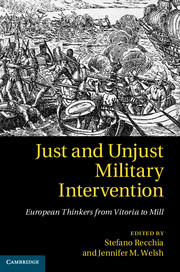The Problem of Military Intervention
Much of American military and diplomatic history can be told in terms of military intervention and counter intervention, as well as debates about the justice and prudence of using force this way. One of the fundamental purposes of the American Declaration of Independence in 1776 was to persuade third parties, like France, Spain, and the Netherlands, to intervene in the conflict against Great Britain. Since France supplied upwards of 90% of the arms and ammunition the Americans used and provided not only a navy but also an army larger than the force of Continental soldiers George Washington brought to the decisive Franco-American victory at Yorktown, the value of foreign intervention to American independence, and the liberty it secures, cannot be overstated.
The Monroe Doctrine established counter intervention against European intervention in the Western Hemisphere as a fundamental tenet of American foreign policy. Extending that principle to the rest of the world was perhaps the most ambitious goal of Americans in the First and Second World Wars, in the League of Nations and the United Nations, in the Truman Doctrine, in Korea (which eventually provoked Chinese counter intervention), in Vietnam, in the Reagan Doctrine, and in Kuwait in 1991. So Americans can never say never to military intervention, especially when justified as counter intervention, though they would be wise to profit from the important limits set to it by the contributors to this volume.
The editors deserve high praise for an impressive, original work of scholarship. Although justifications for military intervention frequently appeal to the European thinkers the contributors investigated, this is the first book to take a comprehensive look at all of them. Moreover, their volume does not skim the surface by examining their important subject merely in light of the usual suspects. The contributors begin even before the beginning of the modern European state system in the sixteenth century and end with the late nineteenth century, when most of the original European terms of the continuing debate over the justice of military intervention became paradigmatic for our own age – and eventually, for the world. Yes, careful scholars do discuss what Thomas Hobbes, John Locke, David Hume, Adam Smith, Edmund Burke, Jean-Jacques Rousseau, Immanuel Kant, Guissepe Mazzini, and John Stuart Mill had to contribute, implicitly or explicitly, to our contemporary debates, but no less careful scholars also explore the byways to the modern age in just war theory, the law of nations, and European colonization of the New World in the lesser known works of Francesco Suarez, Alberico Gentili, Hugo Grotius, Emerich de Vattel, Francisco de Vitoria, and Samuel Pufendorf. Each of the contributors makes an effort to situate these thinkers in their historical circumstances without making them mere prisoners of history. Each of these thinkers contributes something to what one of the contributors, Pierre Hassner, considered a necessary and fruitful dialogue regarding modern principles often in deep tension with each other, but alas, not a dialogue that lends itself easily to categorical conclusions.
As Jennifer Pitts reveals in her discussion of Vattel, the norm of nonintervention, still the default position of the modern age, did not happen merely as a result of the Treaty of Westphalia, which actually codified rights of intervention to protect religious minorities. Nonetheless, it served as an ideal type, a standard for Vattel and most who came after him of respecting human dignity by respecting the rights of different communities to work out their destinies free from foreign interference. Prior to that norm, just war theory also served as a partial check on intervention. For Augustine and his followers, war was an evil. It could be justified only as an act of defense against direct attack. As the Spanish expanded into the New World, however, some justified intervention, or disguised conquest, in humanitarian terms, like preventing cannibalism and converting heathens.
As William Bain reveals, however, these military interventions produced moral and political objections, conscientious interventions, if you will, with Vitoria famously arguing for armed intervention to protect innocent victims of conquest. As Richard Tuck observes, however, by the seventeenth century, the taste for both intervention and counter intervention appears to have cooled. Grotius famously justified war to punish sovereigns who abused their citizens, but perhaps because of his keen understanding of Thucydides and the famous failed Athenian expedition to Sicily especially; Hobbes treated war in general, and voluntary interventions in particular, as a gamble unlikely to achieve its objectives but likely to squander precious resources. Pufendorf was skeptical of the paternalism latent in many arguments for intervention, so he was reluctant to countenance it on behalf of strangers, unless they specifically requested it.
True to form, John Locke, as Samuel Moyn explains, was concerned with the problem of right authority, especially when both sides consider themselves in the right, as they usually do, and with resistance to intervention. “Who shall be judge?” Locke famously asked. His response: The people shall be judge, thus justifying a right of resistance to foreign intervention invoked in anti-colonial revolutions ever since. Edwin van de Haar, offers a sober assessment of Hume’s and Smith’s usually common stance. Their priority was liberty, at home especially, but the security of liberty at home depended on the international environment, especially the norm of non-intervention and the balance of power. So they were perhaps most strongly opposed to intervention, lest it disturb the international order on which the domestic order depends. Although it is conceivable they might have supported intervention to punish foreign oppressors, especially if the act also served a vital national interest, they tended to fear the domestic consequences of intervention abroad. Governing others by force abroad might breed habits, tastes, and sympathies inimical to freedom at home.
As Pierre Hassner shows, Rousseau, Kant, and Hegel were all over the map. Because of his many paradoxes, one cannot tell whether Rousseau, the champion of compassion, would come down on the side of humanitarian intervention, or Rousseau, the champion of self-sufficient autonomous republics, would have been deeply suspicious of self-appointed liberators. Kant is categorical, as usual, in denouncing foreign intervention, but ironically, justifies it against an unjust enemy to change its constitution. Not quite true, says Andrew Hurell, because Kant was referring to states, like France under Napoleon perhaps, that were first and foremost internationally aggressive. Regime change for Kant was thus an unfortunate necessity in a particular case, not a license for self-righteous crusades. Indeed for Hurell, Kant’s positions have been stretched beyond all recognition to justify the interventionist positions of contemporary interpreters. He is best understood as an international pluralist, focused on the law of nations, not a Wilsonian, though one might claim that Hegel was the most bellicose and unambiguously interventionist of all these thinkers, a prototype of the neoconservative who would bring civilization and the rule of law to “barbarous peoples” by means of force in the name of the triumph of the World Spirit.
Jennifer Welsh explores an underlying unity to Edmund Burke’s apparent inconsistencies. He was first and foremost a statesman, a man of prudence, and deeply concerned with the moral health of his country and his culture. Fearing that oppressing Americans, who were fellow Englishmen of a different stripe, would teach Englishmen in England to oppress each other, he pled for conciliation, not war with the American colonies. Fearing that the French Revolution would overthrow the common culture of Europe, and introduce an age of fanatical “armed doctrines,” he also pled to kill the viper in its crib with preventive war.
In contrast, Giuseppe Mazzini, often caricatured as a proto-Wilsonian or Che Guevara of foreign interventions on behalf of democratic government, turns out, in the hands Stefano Recchia, to be a moral realist. He embraced the right of each people to establish its own form of government and he championed democratic government above all, but he opposed regime change in support of democratic government through direct military intervention, doubting that the change would be genuine or could be lasting once the foreign force was withdrawn, a doubt shared by many veterans of the wars in Iraq and Afghanistan today.
Michael Doyle gets the last word in the volume with a discussion of Mill’s principled aversion to exporting democracy by force and Mill’s prudential reasons to make exceptions to or override that principle. For example, for Mill, the liberal victor, following a successful war against a foreign despot, may impose regime change to remove a standing menace to peace. Mill was probably thinking of Napoleon, but the examples of regime change in Germany and Japan after the Second World War also come to mind.
The initial theme of this volume was the justice or injustice of foreign military intervention, but as it develops, prudence becomes a no less important issue. Even if humanitarian intervention is justified under the United Nations’ standard of the “right to protect,” as some might say regarding Syria today, what good would it do? What would it cost? Might Europeans and the United States, the only powers able and possibly willing to undertake this task, leap from the frying pan into the fire by enabling Al Qaeda to replace the Assad regime? If Hume and Smith were right to regard the balance of power as both the guarantor of the international order and the foundation of domestic orders able to secure liberty, might the opportunity cost of humanitarian intervention, and regime change in the manner of 2003 in Iraq, prove a distraction from the greatest killer and foremost threat to freedom of the past hundred years: war among great powers? If preventing such war is the greatest strategic priority of humanity for the twenty-first century, avoiding distractions would have to be its first, most necessary corollary.
Political authorities, however, as shown at the beginning of Shakespeare’s Henry V, prove remarkably adept at manipulating the principles, e.g., Sallic law, that might justify foreign military adventures to suit their interests and ambitions. Prince Hal, the humanitarian, loved France so much that he told Kate, his queen to be, that he would not part with an inch of it. Thus, skepticism about the principles used to invoke intervention, whether as means by which authorities dupe others or themselves, is always prudent. The conundrums of foreign military intervention are so great that we need help to preserve the kind of moral health Burke championed in his understanding of prudence. The editors and the contributors of this volume deserve nothing but gratitude for using the past and its most celebrated minds in Europe to help us think through the challenges military intervention poses for our own time.



